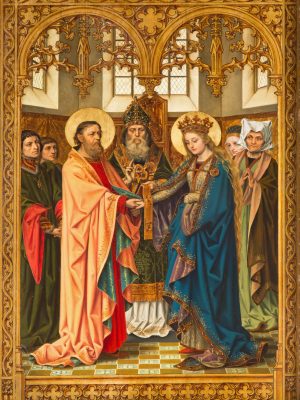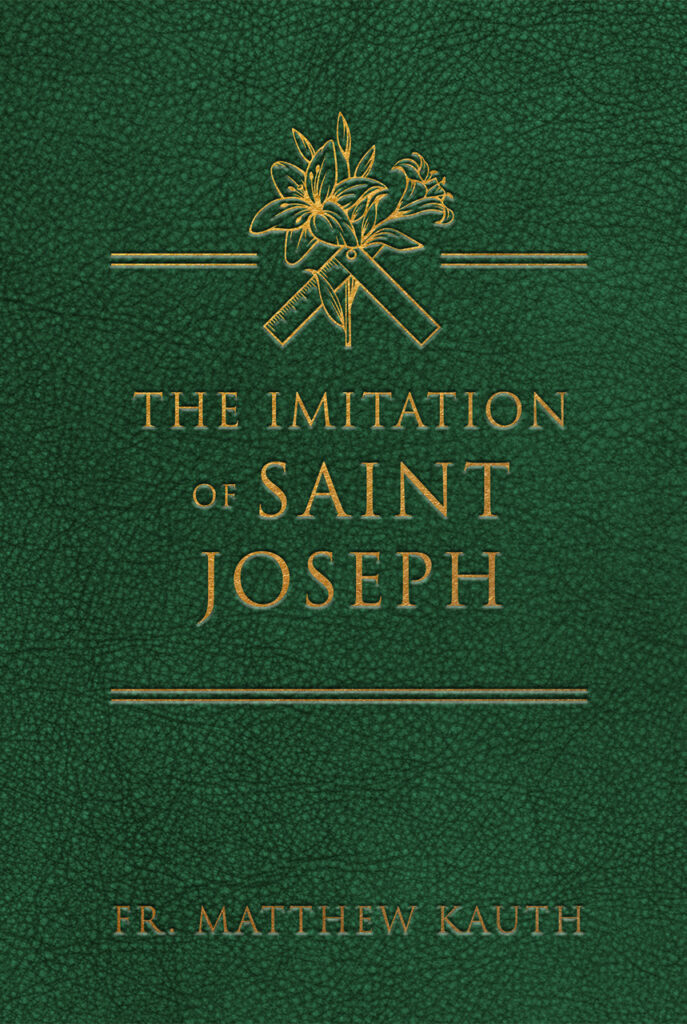The Imitation of Saint Joseph is a masterful and meditative encounter with the foster father of Christ, written with devout care and insight by Father Matthew Kauth. Here, he chronicles the burning love of Saint Joseph for his spotless spouse.
And what did you see when you saw her? Tota pulchra est!
You perhaps more than any man, just and filled with grace, could appreciate what you saw. The capacity to appreciate is literally to know the price or worth of something. You could not have known what this Immaculate Conception cost. You could have had no knowledge of what took the Church centuries to properly see, allowing for her eyes to grow accustomed to the light.
The beauty you beheld cost the infinite price of a child not yet conceived in her. What you saw was from a world which once was but is no more. What you saw was pointing to a world that would be. That beauty would stab. So pleasing to behold for eye of body and of mind. Yet so filled with a sense that it cannot be and that by it I am undone.
She is the true masterpiece, the art of the Master. She is what is possible when there are no obstacles and no refusals to the hand of the Artisan.
But you looked upon her. Did you think it possible? “O Lord my heart is not proud nor haughty my eyes. I have not gone after things too great for me” (Ps 131:1).
You could not have suspected that this sublime flower in the garden of God would be entrusted to you. But she was.
What was the mohar your father could have paid to Joachim? What is her equal? What could you have possibly offered God the Father for the hand of this chosen vessel?
What ring sufficient to match the priceless beauty of her hand? Did you make it yourself? She needed no adornment for she was clothed with the sun. What could you, artisan that you were, possibly forge that would be jewel enough for that perfect setting?
Espousals without yet living together? What might be practical in terms of youth or the preparations for a home is also profound. You had to wait after your espousals.
It has that play about it like unto a game of tag. When children have that first flame of “other,” of male and female, there is a sense of playing with fire itself. We touch it and pull back the hand. We run over it or around it such that the tongues leap at us but do not catch us.
There is a natural sense of danger between us as men and women. We are safer among our own. We play with fire when we play with each other. But we were meant to do so. If not for the Fall, we would learn to live in the heat of the other and not get burned. Human love is a playground of divine love. It is where we learn about something other and prepare for the Other, the living and consuming flame that we are made to live inside and yet not be dissolved.
She was this burning bush already. This was the highest white-hot flame any human dared to approach. Of course it was pure. Of course it was intense. One cannot draw closer to God without drawing close to the burning bush.
We who are used to dabbling around in the mere muck of passions, thinking them hot, are experiencing the heat of ice, not of flame. Love that is fire is not for the faint of heart.
But you were not faint of heart, Joseph. You were a man after God’s own heart. And so, as He loves her, so in proportion did you. You were betrothed. You touched that hand when you made your espousals. Did it burn? Were you branded? That hand would be yours. It would fit into your rough and worn palm and find security and strength there. Did you stare at your hand that night by the candlelight? Did you marvel that something so poor held something so rich? A man knows when he is out of his league. He rises or recedes. You rose.
ooo
This article is taken from a chapter in The Imitation of Saint Joseph by Fr. Matthew Kauth which is available from TAN Books.









